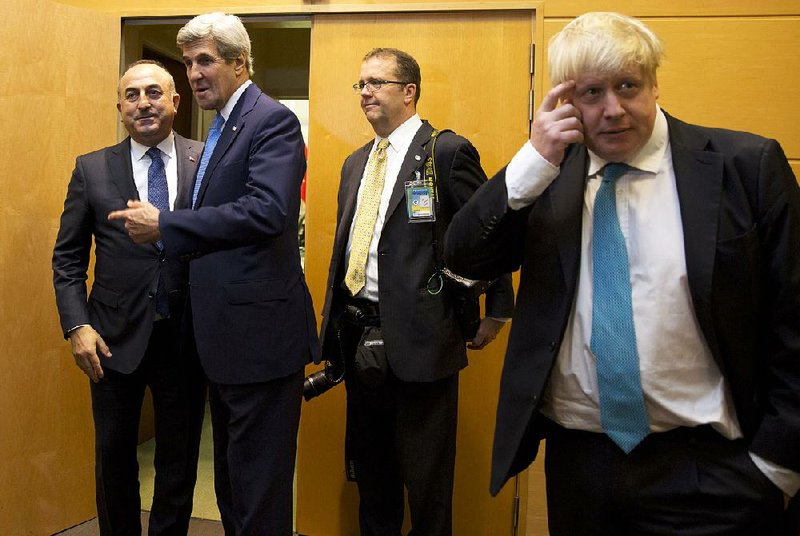BRUSSELS -- NATO and the European Union made a public show of unity Tuesday in the face of criticism from Donald Trump, hailing their deepening cooperation as the U.S. president-elect insists European allies start pulling their own military weight.
In the presence of EU foreign-policy chief Federica Mogherini, NATO foreign ministers endorsed more than 40 proposals for boosting cooperation on cybersecurity, sea operations, and helping neighboring countries better defend themselves.
"Today, we really mark a milestone in our effort to build cooperation," NATO Secretary-General Jens Stoltenberg told reporters during a break in a two-day meeting in Brussels.
Trump lambasted European nations during his presidential campaign for not investing enough in defense and said he wants NATO to do more to combat terrorism. Fewer than half a dozen of the 22 allies in the EU spend 2 percent of their gross domestic product annually on defense, a threshold target set by NATO.
The United States, by far NATO's biggest funder, has for years demanded its partners to spend more, but Trump's heated and unpredictable rhetoric has unsettled many allies.
They also are wary of Trump's uncritical view of Vladimir Putin even as the Russian president makes more assertive use of his armed forces in Europe.
U.S. Secretary of State John Kerry, appearing at his last NATO ministerial meeting, agreed that "unity is very, very important" for the defense alliance.
"We need to come together, to make sure there is a strong Europe, a strong NATO and that the values and the interests that we all share, we are continuing to work on together," Kerry told reporters.
The Brussels meeting was aimed in part at reassuring the incoming U.S. administration that European allies are spending more and that the world's biggest military alliance is already doing plenty to combat terrorism.
Indeed, some allies are waiting for Trump to spell out exactly what more he believes they can do.
Despite doubts about what the future holds, Stoltenberg said he is "absolutely certain that the United States will remain committed to the trans-Atlantic bond, will remain committed to NATO and will live up to ... the security guarantees to Europe."
While NATO and the EU have 22 common members, cooperation between them has been hindered by different visions over which organization should have primacy in defense matters.
"It is a very good thing if countries talk about other arrangements for their security and their defense, but that should not in any way undermine NATO," British Foreign Secretary Boris Johnson said.
Of the 42 proposals, one-quarter deal with countering so-called hybrid threats such as propaganda, political and economic interference, or disguising trained military personnel as militias, as Russia did in Ukraine.
Others involve better coordinating NATO and EU crisis-response activities, and studying whether to conduct joint and coordinated military exercises. But they remain proposals, and nothing concrete in terms of defense programs were on the table.
Only four of the European Union's NATO countries have met their pledge to spend at least 2 percent of gross domestic product on defense, according to the organization's figures, with the U.S. contributing more than 70 percent of the alliance's overall defense expenditure.
"We must spend more, but military strength is not everything," said German Foreign Minister Frank-Walter Steinmeier.
Tuesday's talks also were expected to focus on NATO's role in helping to stabilize Iraq and Syria.
Information for this article was contributed by Ian Wishart and Gregory Viscusi of Bloomberg News.
A Section on 12/07/2016
